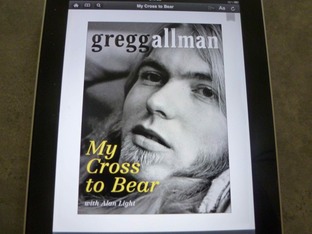Tuesday, 26 March 2013

There’s an issue that cuts to the core of the should I read this question that invariably pops up when you sight news that someone whose music you’ve devoured over the years has “penned” an autobiography. In most cases, if you’ve been on board for a while you already know most of the story, or at least most of that part of the story that the subject/author has allowed to slip out. When you look at something like My Cross to Bear and you already know about the origins of the Allman Brothers Band, the deaths of Duane Allman and Berry Oakley, Gregg’s flirtation with Hollywood celebrity (his marriage to Cher), the drug busts, bouts with drugs and alcohol, liver transplants yada, yada, yada, you start to wonder whether there’s much more to tell.
Consciously or not, Allman sets out to give the reader the impression that there is by starting the tale towards the end, with the ABB’s induction into the Rock and Roll Hall of Fame in 1995, which came at the end of a five day binge. I was out of it — mentally, emotionally and spiritually. I was drunk, man, just s---faced drunk, the entire time. Welcome to the story of my life.
With the prospect of rock’n’roll excess writ large, things continue much as you’d anticipate, beginning in Nashville and a fatherless childhood (his father, a D-Day veteran was shot in the back and killed by a stranger he’d offered a lift home from a bar when Gregg was two). In those circumstances you’d guess little brothers (baybruh was Duane’s term for it) tend to see elder male siblings as quasi-father figures and two stints in military school as a young boy are the sort of thing that’d tend to strengthen the bond.
From there it’s off to Daytona Beach, Florida, where the teenage Allmans assemble the first of several cover bands, leading up to the Escorts (1965, the Beatles-imitation), the mod Allman Joys (1966, mod-influenced) and the Hour Glass (1967, psychedelic) on the way to the jam on 26 March 1969 that signalled the birth of the Allman Brothers Band. Over the preceding couple of years they’d moved from Florida to California by way of Georgia and when California failed to work out Duane had picked up session work at Muscle Shoals, recalling his brother from Los Angeles when he had the makings of a decent band.
If the jam hadn’t worked out, the odds are, according to Allman, that he’d have ended up studying medicine or dentistry, which suggests there’s the odd brain cell lurking below Gregg’s minimalist on-stage patter.
Gregg had been the first to pick up a guitar (visiting family in Tennessee one summer) after an R&B show featuring Otis Redding, but it was soon obvious that the older Allman could play circles around his sibling. Baybruh did more than get one of the great guitarists started. With Duane suffering from a cold Gregg left a bottle of Coricidin and the first Taj Mahal album outside his brother’s door on the morning of his twenty-second birthday. The Coricidin bottle became Duane’s preferred slide and by the evening he was sort-of able to play along with Jesse Ed Davis on Statesboro Blues.
Within four years of that first jam the Allman Brothers Band was, for all practical purposes, the biggest band in the USA, headlining with The Band and the Grateful Dead at Watkins Glen in front of an estimated crowd of six hundred thousand, but success came at a price.
Given the closeness of the fraternal relationship you might have expected a detailed discussion of the circumstances surrounding Duane’s death in a motorcycle accident on 29 October 1971, barely a fortnight after Live At Fillmore East went gold. There’s a chapter devoted to the accident, but little that would count as new information apart from the revelation that there’d been an incident on the morning of the accident involving Duane’s cocaine stash and a subsequent phone call that meant Gregg’s last words to his brother were a lie, something that haunted him for years and could probably be seen as the cause of later drug and alcohol issues if they hadn’t been there already.
Cocaine got him through the funeral, but the two of them had already tried heroin, and the pair’s recreational use before Duane’s death had been significant (and noticeable enough) to have them pulled aside for a warning from Atlantic Records’ Ahmet Ertegun and Jerry Wexler, who’d seen plenty of artists’ careers take a nosedive due to the effects of addiction.